new to the gluten free journey?
new to the gluten free journey?

The Error-Free Gluten Free Food List
Unfortunately, the gluten-free diet has been “adopted” by bloggers, diet book authors, magazines and other media, and they’ve turned it into something “more palatable” to the general public, but something that isn’t gluten free at all. For those with symptoms caused by gluten sensitivity or Celiac, eating gluten free isn’t a fad, it is an absolute necessity and gluten free diets or gluten free food lists put together by those who are not experts in gluten or Celiac disease are often filled with errors.
For instance, many of them include foods such as buckwheat, oats, corn gluten, amaranth and rice, without taking into consideration that these grains either are at high risk of cross-contamination with gluten, or are high in glutamic acid, which can cause problems for those with neurological issues. Basically, these “gluten free food lists” and “gluten free diets” are actually just wheat free.
Another issue with gluten free food lists created by non-experts is that they often focus on grains and fail to include foods and even non-food items that commonly contained gluten, usually used as a stabilizer or cheap filler. These items can be anything from soy sauce to postage stamps. If you’d like a more in-depth discussion of these foods, including processed and pre-packaged foods, you can see our comprehensive gluten free food list here.
If avoiding gluten is essential, here is a gluten free food list that completely bypasses the questionable foods, yet leaves you with plenty of wonderful food to enjoy. Not only will you be gluten free, you’ll also be getting a wide variety of nutrients, healthy fats and antioxidants.
If you’re trying to lose weight and shed fat, simply switching to a diet that contains only these foods will help you lose weight without counting calories, because it includes almost no processed foods. You’ll also notice that dairy foods have been excluded from this gluten free food list. This is because it’s been found that the compounds in processed dairy can mimic gluten and create health problems that are similar to celiac disease.
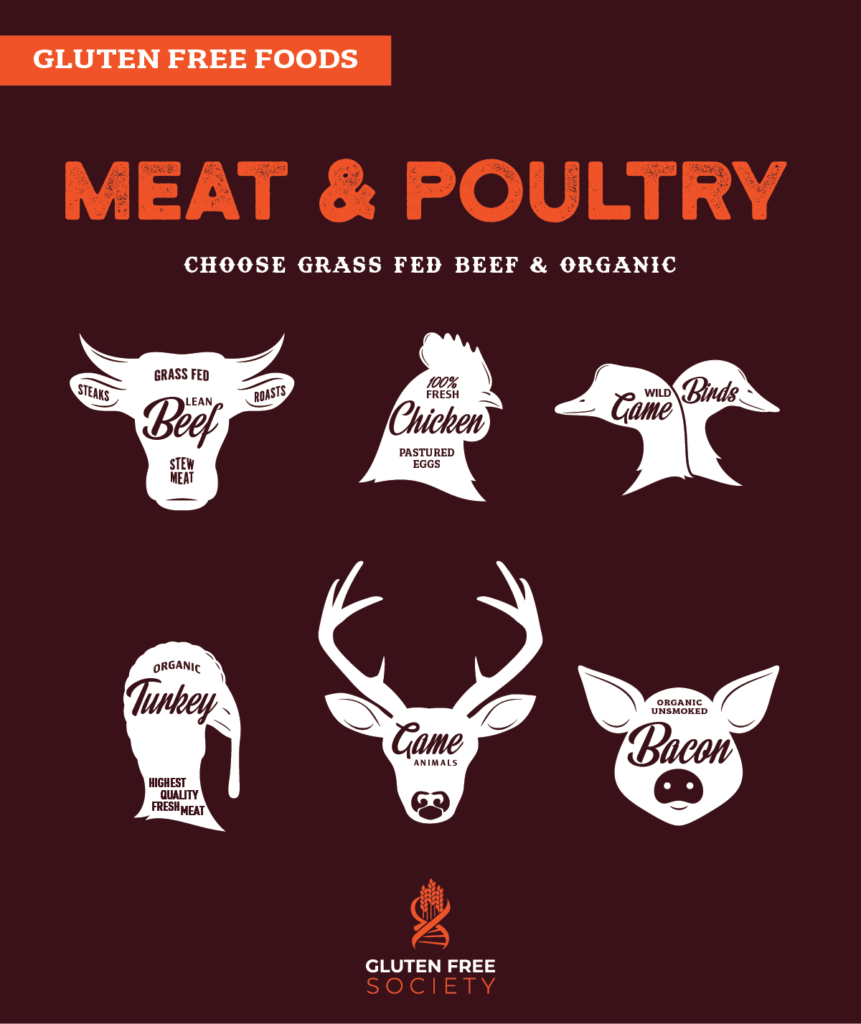
When it comes to protein, be sure to choose grass-fed (grass-finished), wild-range, and organic.
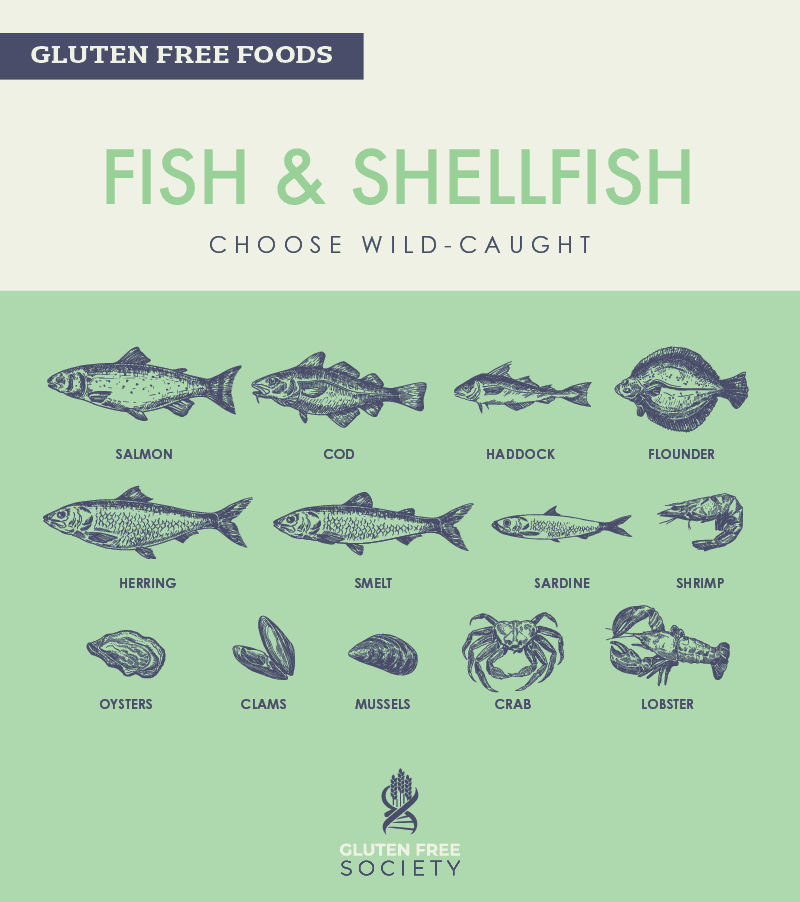
When it comes to Fish and Shellfish, always choose wild-caught. Farm-raised seafood is often fed a diet of corn and other grains, it is lower in Omega-3 fats and they are often given antibiotics.
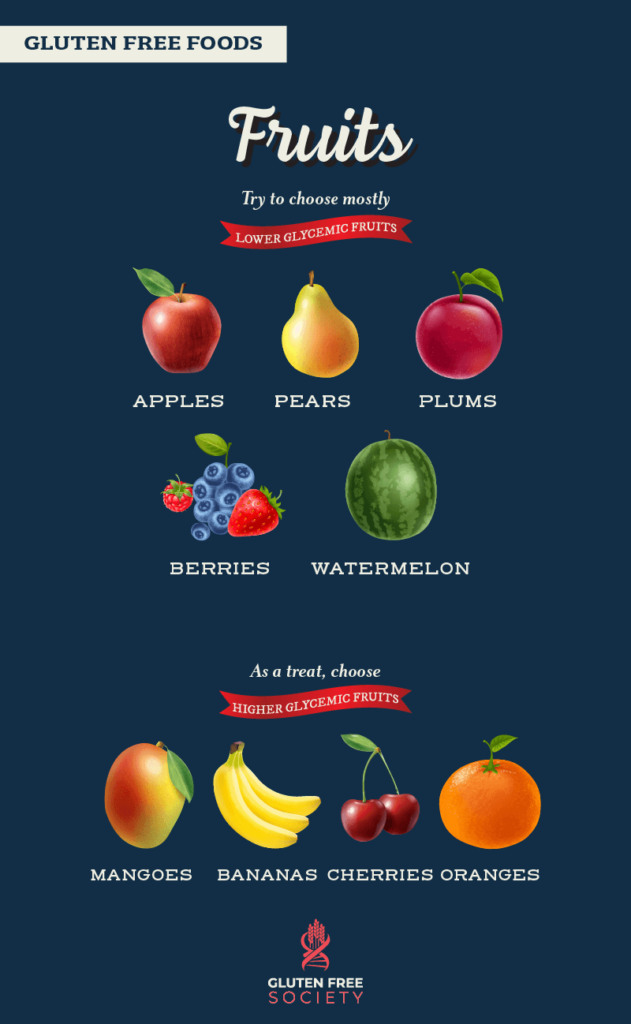
All organic and non GMO fruits are acceptable and should be enjoyed. Frozen is generally acceptable if there is no added sugar. Try to choose lower-glycemic fruits such as apples, pears, berries, plums and watermelon for the majority of your meals. I would suggest only eating higher-glycemic fruits such as mangoes, bananas, cherries and oranges as treats.
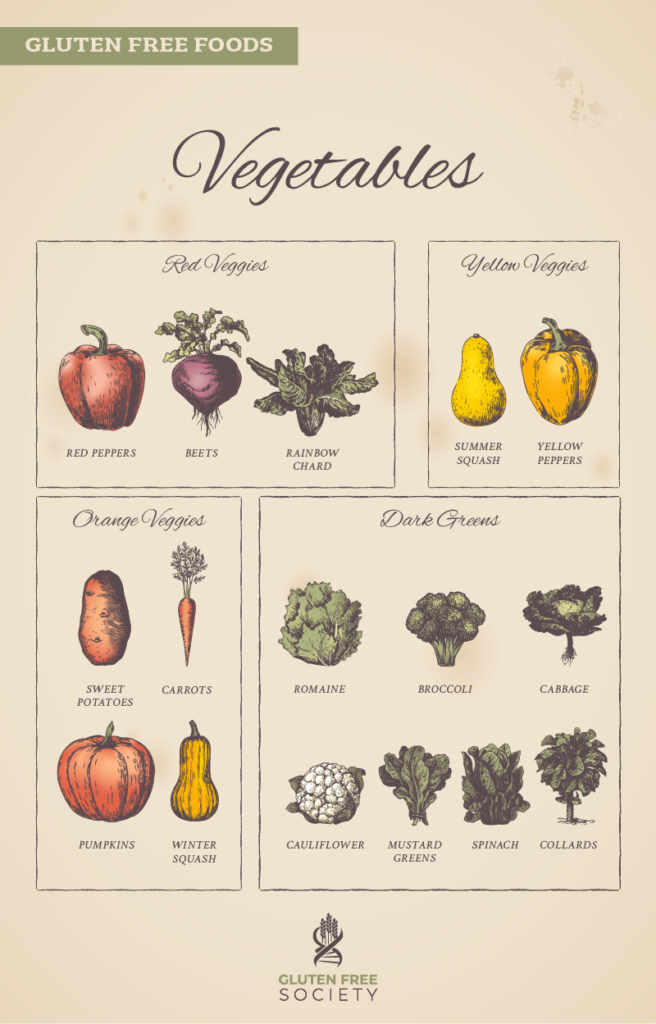
All organic and non GMO vegetables can be enjoyed, with the exception of soybeans, edamame and corn (neither of which are truly vegetables).
Try to get a wide variety of fresh vegetables. Doing so will deliver more antioxidants and a better range of vitamin and mineral content.
Red veggies might include red peppers, beets, tomatoes (yes, it is actually a fruit) and rainbow chard. Yellow veggies include summer squash, and yellow peppers. Orange veggies are high in beta carotene, essential to boosting the immune system and reducing inflammation. Some great choices are sweet potatoes, carrots, pumpkin and winter squash. Include a wide variety of dark greens such as kale, spinach, Romaine, collards, mustard greens and beet greens. Also include plenty of broccoli, cabbage, and cauliflower as well. They boost immunity and also help remove toxins from the system.
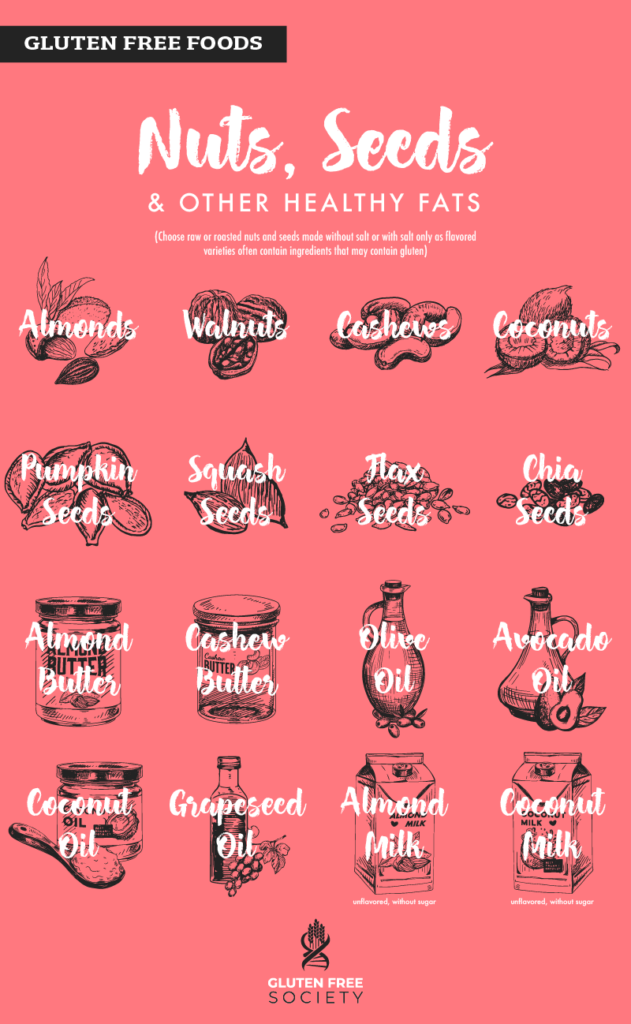
If opting for nuts and seeds as snacks, make sure they are either raw or roasted, and made with very little salt (preferably no salt) – the flavored varieties often contain cross-contaminated ingredients.
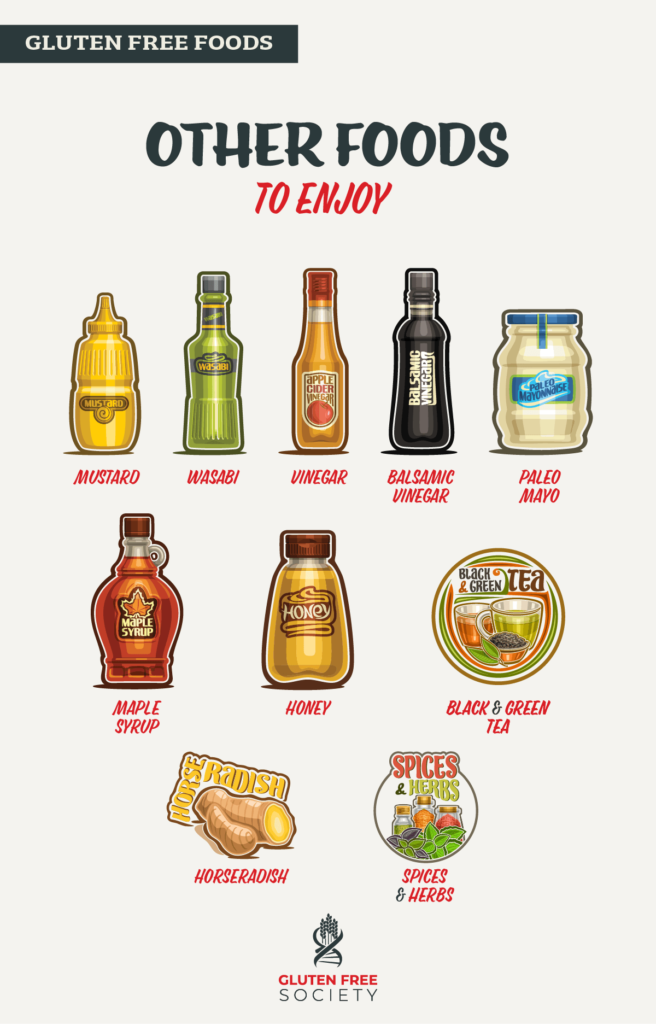
Condiments can be tricky, but there are good brands out there. Always be sure to read labels for additives, and make sure they are not produced by a plant that processes wheat.
Of course, this food list is not a one-size fits all. If you know you are allergic or reactive to any of these ingredients, avoid them. Either way I hope this is a good resource for you, and that you stay encouraged to eating and living a healthy lifestyle.
Stay up-to-date with the latest articles, tips, recipes and more.

*These statements have not been evaluated by the Food and Drug Administration. This product is not intended to diagnose, treat, cure or prevent any disease.
If you are pregnant, nursing, taking medication, or have a medical condition, consult your physician before using this product.
The entire contents of this website are based upon the opinions of Peter Osborne, unless otherwise noted. Individual articles are based upon the opinions of the respective author, who retains copyright as marked. The information on this website is not intended to replace a one-on-one relationship with a qualified health care professional and is not intended as medical advice. It is intended as a sharing of knowledge and information from the research and experience of Peter Osborne and his community. Peter Osborne encourages you to make your own health care decisions based upon your research and in partnership with a qualified health care professional.
28 Responses
Great information!
Hi,
I’m allergic to wheat and rye, but not barley. Do i need to worry about all hidden gluten, or just these two grains?
Very confusing.
Hi. Allergy is not the same as sensitivity.
I have been having some sharp pain in my abdomen. It feels like very sharp pain around my ribs. Is this part of not having a gluten free diet?
A very interesting article!
What is a complete protein if you don’t eat meat/fish/dairy/wheat?
I eat tofu but notice that soya beans are excluded in gluten free diet. I would also get complete protein by combining beans with wheat.
I would appreciate your expert opinion.
Thank you.
Dr. Mercola says never eat Soy, unless it’s fermented…Netto, etc. I normally would provide a link to his article, but now you have to do a search and hope to find it. Soy is poison. Don’t eat it.
Dr. Wahls in her protocol book does an excellent job covering complete protein if you absolutely must stick to being a vegan.
How is it that you think it is possible to eat beans and wheat and still get a gluten-free result? Say WHAT?
Hemp seeds are a complete protein, and hempseed protein powder. They are non gluten, 30 percent digestible protein, high in omega 3 in good balance. Chia is also good, as well as tempeh which is fermented soybeans
My understanding is that all seeds contain gluten which is used for the seed to sprout. Is this true? I have removed pumpkin, sunflower, flax, sesame and hemp from my diet because of this but would love to include them again if this is not true.
Isn’t the problem with soybeans also the fact that over 90% are GMO? That’s why I am confused by tempeh
Go for Certified Organic Tofu or Tempeh that are Made in USA. Check out the scoreboard here:
https://www.cornucopia.org/scorecard/soy/
What brand of coconut milk can I drink? All of the brands either have xanthan gum, gellan gum or carrageenan or combination of these gums.
Also what brand of iced tea is safe to drink?
Thanks!
Native Forest Coconut Milk,
Thrive Market Coconut Milk/Cream,
Traders Joe’s Coconut Milk/Cream,
Lets do…Organic Heavy Coconut Cream
All these options don’t have any gums, only 2 ingredients: water and coconut👍🏻
Be careful with Native Forest. It has to be the one marked SIMPLE. The others do have guar gum. I’m not commenting on any of the others because I have not experienced them.
I like the Aroy D brand. It is made in Thailand and has only one ingredient, coconut milk. No gums, fillers, or any additives. Now, it needs to be shaken and varies in consistency since it is a natural product with no processing but it is rich and delicious, a great substitute for half and half in my coffee. Fortunately I live near an Asian market so it is easy to buy but you can order it from Amazon and other places if it is not available near you.
Is Black rice ok?
Are vital proteins with collagen ok to take with celiac disease?
Hi Karen,
We cannot vouch for other brands, as we do not know the efforts behind the scenes being taken to ensure gluten free status. We can recommend Ultra Collagen – https://env-gfsociety-staging.kinsta.cloud/shop/supplements/general-health/ultra-collagen/
All the best!
I would always look for a grass fed/finished collagen that is gmp or third party tested if possible.
Just what I was looking for! I can do it now!
Hello
I would like to claim my new Book in order
Thanks
Hi with celiac disease can one take porridge which has black beans areowroots ,cassava etc
I have taken Ancient Nutrition collagen for a couple of years. I recently stopped taking it because I was diagnosed with melanoma (had surgery to remove it and had clear margins) and also recently read that collagen can cause melanoma and breast cancer. Please tell me if you think collagen is safe for me. I also have GVHD due to having had a bone marrow transplant in 2012.
I notice red and yellow peppers, tomatoes, black tea and cashews on the lists.
We are into our 3D week of the 30 day challenge. When can these be introduced and what’s the best way to do it? Thanks
Remember…much of our grain, seed, legume, soy, corn, oats, wheat, etc. are sprayed to hasten drying before & after harvesting. This should be displayed on ALL food labels.
I read your book. Life changing
Thank you
Can I eat hummus/chickpeas and Basmati Brown rice on a gluten free diet?